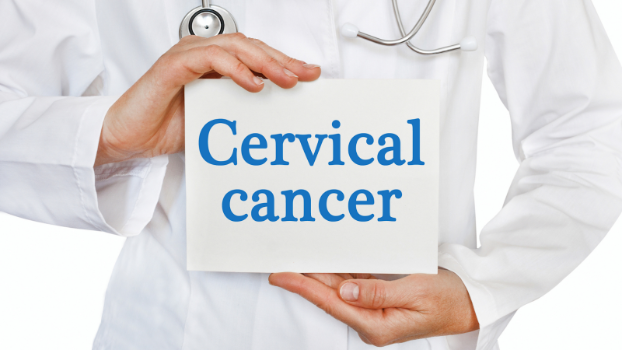posted
on 1/6/2022
in
BLOGS from St. Anthony
 Cervical cancer is the 4th most common type of cancer found in women worldwide. Most frequently caused by a human papillomavirus (HPV) infection, cervical cancer is a disease in which cancer cells form in the cervix, located in the lower, narrow end of the uterus that connects it to the birth canal.
Cervical cancer is the 4th most common type of cancer found in women worldwide. Most frequently caused by a human papillomavirus (HPV) infection, cervical cancer is a disease in which cancer cells form in the cervix, located in the lower, narrow end of the uterus that connects it to the birth canal.
Though cervical cancer was once the leading cause of death in women, the number of both cases and deaths has significantly decreased, thanks to early detection and prevention methods. To keep these numbers down, women must know the signs and symptoms of cervical cancer to receive treatment as soon as possible and learn how they can best protect themselves from developing cervical cancer.
Signs and Symptoms
Typically, symptoms of cervical cancer do not show up in their early stages. Advanced stages will have more severe symptoms, particularly if the cancer has spread to other tissues and organs in the body. Regardless, some of the most common symptoms of cervical cancer include:
- Blood spots or bleeding in between periods
- Heavier or longer periods
- Bleeding after sexual intercourse or menopause
- Vaginal discharge
- Back or pelvic pain
Remember, these symptoms are not always a sign of cervical cancer, so don't worry if you're experiencing any of these conditions. It is, however, vital that you see a doctor to discuss your symptoms so you can be properly diagnosed. If it is cervical cancer, the earlier the detection, the better the prognosis!
Treatment
The severity, type, and length of treatment depend on the stage of cancer and how severe the cancer is. At the beginning of your treatment, you'll work with a multidisciplinary team to create a plan that involves a variety of treatments, which may include surgery, chemotherapy, radiation therapy, medication, targeted therapy, or immunotherapy. Surgery is almost always necessary to remove the tumor from the cervix and some other healthy tissue surrounding it to ensure the cancer won't spread.
Consult with your medical team and doctor to learn about your treatment options and learn the best course of treatment for your case.
Prevention
There are many steps you can take to prevent cervical cancer. Here are some of the best prevention steps and risk factors to avoid to help protect yourself from developing cervical cancer:
- Get an HPV Vaccine
- Use protection when having sexual intercourse
- Limit your number of sexual partners
Additionally, if you are already infected with HPV, these other risk factors may contribute to it developing into cervical cancer:
- Having seven or more full-term pregnancies
- Using oral contraceptives for an extended period
- Smoking
- Weakened immune system
One of the best ways you can continue to prevent cervical cancer is by taking steps for early detection through screening methods, such as pap smears. This will help detect any abnormal tissue or cancer cells before there are any symptoms of cervical cancer.
Trust St. Anthony Hospital for the care you need to help fight cervical cancer. Our team is dedicated to improving the health of the people we serve by providing high-quality, high-value healthcare services responsive to the needs of our patients and the region. In addition to cancer treatment, we also offer several healthcare services to meet various needs.
Visit our website to learn more, or call us at (712) 792-3581 to schedule an appointment today!
Sources:
https://www.cancer.net/cancer-types/cervical-cancer/screening-and-prevention
https://www.cancer.gov/types/cervical/hp/cervical-prevention-pdq
https://www.cdc.gov/chronicdisease/programs-impact/pop/cervical-cancer.htm
Filter
- blog
- cancer
- cancer center
- cancer services